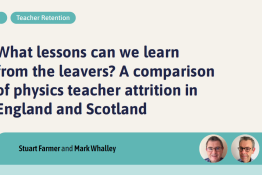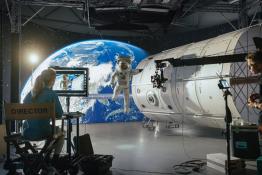How not to climate communicate: understanding directionally motivated reasoning and its impact on climate change education (open access)
Issue 394 | Page 33 | Published Jul 2025
Description
Mary Gagen summarises why, and how, learners’ beliefs and life experiences shape how they interpret climate information and why we need to consider this when sharing factual knowledge in the hope of inspiring climate action.
References
Archer, L., Dawson, E., DeWitt, J., Seakins, A. and Wong, B. (2015) ‘Science capital’: a conceptual, methodological, and empirical argument for extending bourdieusian notions of capital beyond the arts. Journal of Research in Science Teaching, 52(7), 922–948.
ASPIRES Research: www.ucl.ac.uk/ioe/departments-and-centres/education-practice-and-society/research/aspires-research
Bentz, J. (2020) Learning about climate change in, with and through art. Climatic Change, 162(3), 1595–1612.
Blackawton, P. S., et al. (2011) Blackawton bees. Biology Letters, 7(2), 168–172.
Blühdorn, I. (2018) Post-capitalism, post-growth, post-consumerism? Eco–political hopes beyond sustainability. In Post-Sustainability, ed. Foster, J. pp. 39–58. Routledge.
Bolsen, T., Druckman, J. N. and Cook, F. L. (2014) The influence of partisan motivated reasoning on public opinion. Political Behavior, 36, 235–262.
Carbon Brief (2021): www.carbonbrief.org/analysis-which-countries-are-historically-responsible-for-climate-change
Cutter-Mackenzie, A. and Rousell, D. (2019) Education for what? Shaping the field of climate change education with children and young people as co-researchers. Children’s Geographies, 17(1), 90–104.
Davies, R., Gagen, M. H., Bull, J. C. and Pope, E. C. (2019) Maze learning and memory in a decapod crustacean. Biology Letters, 15(10), 20190407.
Dawson, E., Archer, L., Seakins, A., Godec, S., DeWitt, J., King, H., Mau, A. and Nomikou, E. (2020) Selfies at the science museum: exploring girls’ identity performances in a science learning space. Gender and Education, 32(5), 664–681.
Druckman, J. N. and McGrath, M. C. (2019) The evidence for motivated reasoning in climate change preference formation. Nature Climate Change, 9(2), 111–119.
Feinberg, M. and Willer, R. (2011) Apocalypse soon? Dire messages reduce belief in global warming by contradicting just-world beliefs. Psychological Science, 22(1), 34-38.
Gifford, R. (2011) The dragons of inaction: psychological barriers that limit climate change mitigation and adaptation. American Psychologist, 66(4), 290.
Godec, S., King, H. and Archer, L. (2017) The Science Capital Teaching Approach: engaging students with science, promoting social justice. London: University College London.
Hay Festival (2024) The Wales Net Zero 2035 Challenge Group discussions. Hay, UK.
Hayward, B. (2020) Children, Citizenship and Environment: #SchoolStrike Edition. Routledge.
Henderson, J. (2020) EVs are not the answer: a mobility justice critique of electric vehicle transitions. Annals of the American Association of Geographers, 110(6), 1993–2010.
Howarth, C., Lane, M., Morse-Jones, S., Brooks, K. and Viner, D. (2022) The ‘co’ in co-production of climate action: challenging boundaries within and between science, policy and practice. Global Environmental Change, 72, 102445.
IPCC (2021) Climate Change 2021: The Physical Science Basis. Contribution of Working Group I to the Sixth Assessment Report of the Intergovernmental Panel on Climate Change. IPCC.
Kahan, D. (2012) Why we are poles apart on climate change. Nature, 488(7411), 255.
Kahan, D. M. (2017) ‘Ordinary science intelligence’: a science-comprehension measure for study of risk and science communication, with notes on evolution and climate change. Journal of Risk Research, 20(8), 995–1016.
Kahan, D. M., Peters, E., Wittlin, M., Slovic, P., Ouellette, L. L., Braman, D. and Mandel, G. (2012) The polarizing impact of science literacy and numeracy on perceived climate change risks. Nature Climate Change, 2(10), 732–735.
Klein, N. (2014) This Changes Everything: Capitalism vs. the Climate. New York: Simon and Shuster.
Leite, S. (2024) Towards a transformative climate change education: questions and pedagogies. Environmental Education Research, 30(12), 2376–2393.
Marshall, G. (2015) Don’t Even Think About it: Why our Brains are Wired to Ignore Climate Change. Bloomsbury.
Maslin, M. (2019) The five corrupt pillars of climate change denial. The Conversation. https://theconversation.com/the-five-corrupt-pillars-of-climate-change-denial-122893
Oracy Education Commission (2024) We Need to Talk: The report of the Commission on the Future of Oracy Education in England. Oracy Education Commission.
Petersen, B., Stuart, D. and Gunderson, R. (2019) Reconceptualizing climate change denial. Human Ecology Review, 25(2), 117–142.
Reifen‐Tagar, M. and Cimpian, A. (2022) Political ideology in early childhood: making the case for studying young children in political psychology. Political Psychology, 43, 77–105.
Robertson, J. and Murphy, J. (2024) Kyoto. Faber & Faber.
UCL (n.d.) UCL Handbook for Communicating Science Change: www.ucl.ac.uk/climate-change/sites/climate_change/files/ucl_climate-change_handbook-for-comms.pdf
Willis, R., Curato, N. and Smith, G. (2022) Deliberative democracy and the climate crisis. Wiley Interdisciplinary Reviews: Climate Change, 13(2), 759.
Wallis, H. and Loy, L. S. (2021) What drives pro-environmental activism of young people? A survey study on the Fridays For Future movement. Journal of Environmental Psychology, 74, 101581.
Williams, P. D. (2017) Increased light, moderate, and severe clear-air turbulence in response to climate change. Advances in Atmospheric Sciences, 34(5), 576–586.
More from this issue
TIMSS is a large-scale four-yearly international assessment of mathematics and science performance, attitudes and reported experiences. TIMSS...
This article draws on the studies into why physics teachers in England and Scotland had left teaching (Farmer and Whalley, 2025; Whalley, 2024)...
Michael Hal Sosabowski suggests critically analysing science in films to encourage healthy scepticism.
References
...




